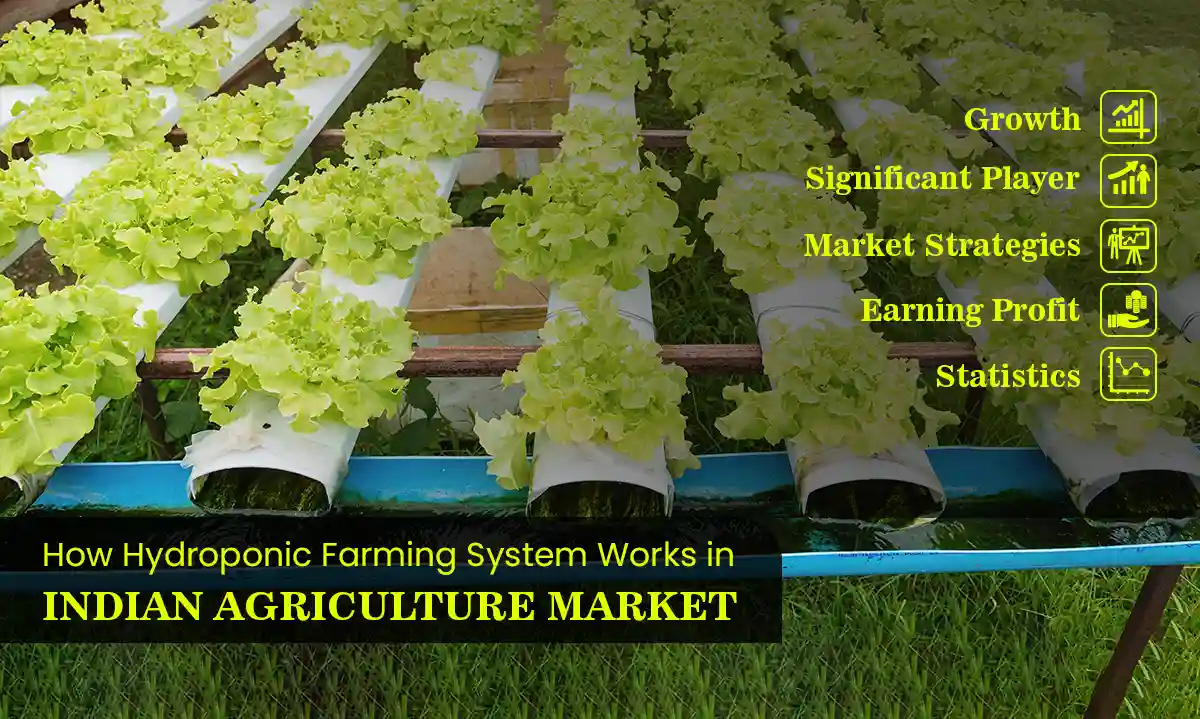How Hydroponic Farming System Works in Indian Agriculture Market

India's agricultural landscape has been quietly revolutionized in recent years by the emergence of hydroponic gardening. With good cause, this novel approach to soilless farming has been gaining popularity. Hydroponics farming is a viable answer to the problems facing India's agricultural industry, not merely a fad with the ability to completely transform conventional farming methods.
The Growth of Hydroponic Industry
Hydroponic farming, a method of growing plants without soil, has been steadily gaining popularity worldwide due to its numerous benefits. By providing plants with nutrient-rich water solutions directly to their roots, hydroponics allows for faster growth rates, higher yields, and efficient use of resources such as water and space.
In India, the hydroponics industry is still in its nascent stages but is rapidly growing. Entrepreneurs and farmers alike are recognizing the potential of hydroponics to overcome the limitations of traditional agriculture, such as dependence on arable land and unpredictable weather patterns. The increasing demand for organic produce and the need for sustainable farming practices further drive the growth of the hydroponics industry in India.
Why India will be the Significant Player in Hydroponics
India's diverse climatic conditions and limited availability of arable land make it an ideal candidate for hydroponic farming. With hydroponics, farmers can grow a wide variety of crops year-round, regardless of the external environment. This level of control over growing conditions minimizes the risks associated with traditional farming, such as crop failure due to droughts or floods.
Moreover, India's burgeoning population presents a significant market opportunity for hydroponically grown produce. As consumers become more health conscious and environmentally aware, the demand for organic hydroponic farming products is expected to soar. With its vast agricultural potential and growing market demand, India is poised to emerge as a significant player in the global hydroponics industry.
Market Strategies for Successful Hydroponic Farming
To succeed hydroponic farming in India, it is essential to implement effective market strategies tailored to the unique needs of the Indian market. One such strategy is education and awareness. Many Indian farmers may be unfamiliar with hydroponics and its benefits. Therefore, educating farmers about the advantages of hydroponic farming and providing them with training and support is crucial for widespread adoption. Additionally, fostering collaborations and partnerships within the industry can help drive innovation and scalability. By working together with researchers, technology providers, and government agencies, hydroponic farmers can access the latest advancements in farming techniques, equipment, and infrastructure.
Furthermore, embracing technology is key to optimizing productivity and efficiency in hydroponic farming. From automated nutrient delivery systems to IoT-enabled monitoring solutions, technology can help farmers precisely control growing conditions and maximize yields. Investing in research and development to adapt hydroponic farming systems to local conditions and crop varieties is also essential for long-term success.
Earning Profit in Hydroponic Farming Method
While the initial investment in hydroponic farming may be higher compared to traditional methods, the profit potential is significant. With higher yields, faster crop cycles, and premium prices for organic produce, hydroponic farming offers an attractive return on investment.
Moreover, by eliminating the need for soil, hydroponic vertical farming reduces the risk of soil-borne diseases and pests, leading to lower input costs for pesticides and fertilizers. Additionally, the ability to grow crops vertically in stacked systems maximizes land utilization, further enhancing profitability.
Statistics of Hydroponic Farming in India
Hydroponic farming in India has demonstrated encouraging growth tendencies, even if it is still in its early phases. Recent industry assessments predict that throughout the projection period, the hydroponics market in India will expand at a compound annual growth rate (CAGR) of more than 20%. Numerous causes are driving this expansion, such as growing consumer demand for organic products, growing awareness of sustainable agricultural methods, and developments in hydroponic technology.
As of 2023, the hydroponic farming system had spread across various regions in India, majorly in urban surroundings. To make this method more operational, individual entrepreneurs run small-scale hydroponic operations and large commercial facilities are built to cater to domestic and export markets. Hydroponics in India is also noteworthy for its diversity of crops such as encompassing leafy greens, herbs, tomatoes, cucumbers, strawberries, and more.
Furthermore, government initiatives and support schemes aimed at promoting sustainable agriculture and entrepreneurship are contributing to the growth of hydroponics in India. Subsidies for setting up hydroponic farms, training programs for farmers, and incentives for adopting innovative farming techniques are some of the measures implemented to foster the development of the hydroponics industry.
Looking ahead, the future of hydroponic farming in India appears promising, with industry experts predicting continued growth and innovation. However, challenges such as high initial investment costs, technical expertise requirements, and market competitiveness remain areas of focus for stakeholders. Nevertheless, with the right mix of government support, industry collaboration, and technological advancements, hydroponic farming is poised to play a significant role in India's agricultural transformation towards sustainability and resilience.
In conclusion, hydroponic farming presents a promising opportunity for sustainable agriculture in India. By adapting to the Indian market landscape and implementing effective market strategies, hydroponic farmers can not only reap financial rewards but also contribute to food security, environmental conservation, and economic development. As the hydroponics industry continues to grow, India stands poised to lead the way towards a greener, more prosperous future.
Latest Blog
JOIN OUR COMMUNITY !
Stay connected with Getfarms! Follow us on social media for the latest updates, exclusive offers, and a glimpse into the world of farmhouse living. Join our community today




























